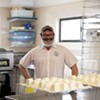Published May 17, 2006 at 4:00 p.m.
Three-foot-tall logs stand sentinel in a shady corner of a Bristol backyard, looking like a ceremonial array inspired by the mysterious stone statues of Easter Island. But the purpose of these 100 or so hardwood columns planted in regimental formation on Eric Swanson's property is not religious but commercial.
Each has been inoculated with spores that will eventually produce chicken-of-the-woods mushrooms, which Swanson plans to sell either in their current form or as harvested fungi.
This backyard cultivation is part of a unique culinary and ornamental enterprise called Vermush, which Swanson launched three years ago. His one-man company also sells mushroom-growing kits online -- http://www.vermush.com -- and at co-ops and health food stores in Addison and Chittenden counties.
These retail outlets typically introduce Vermush products to their customers with eye-catching displays of the kits, which resemble space helmets encasing foot-high stumps. One such point-of-sale presentation drew stares last month at the Middlebury Natural Foods Co-op, where a carved wooden mushroom thrusted up phallus-like from the center of the display.
But kits also proved intriguing in their own right, according to co-op produce manager Karin Mott. "Families with kids were especially interested," she says. "They thought it looked like some sort of science experiment."
Mott herself bought a kit to keep watch over at home. About a dozen co-op members did the same, paying $29.99 for a mini-fungus farm that Swanson says will keep on cropping oyster or shiitake mushrooms for as long as a decade.
He prepares the kits inside his home on a quiet street near Mount Abraham High School. The 36-year-old Bristol native graduated from there and has worked for the past 15 years at the University of Vermont, currently in the electrical department.
"I was always interested in botany, but I got into mushrooms specifically when I took a mycology course at UVM about eight years ago," says the elfin entrepreneur, who measures about 5-foot-4-inches from his white socks to his shaven head. "When I get into something, I really dive in head-first, so this became a big part of my life."
Big enough to lead Swanson to quit the local reggae group Lambsbread, for which he played keyboard for several years. He still does an occasional gig with the band, and noodles daily on his instrument in a music room that looks out over the germinating logs in his backyard.
Along with enthusiasm, Swanson brings a great deal of patience to his avocation. It's a necessary virtue for an endeavor that takes a long while to bear fruit.
The kits won't produce any mushrooms for at least a few months, and anywhere from one to three years will pass before chickens-of-the-woods sprout from the freestanding logs. Even then, the harvest is meager in the case of the kits. Swanson says buyers can expect to collect no more than 10 mushrooms per month once the logs start to fruit.
"It's more an ornamental thing than a food source, though it does allow for an occasional gourmet indulgence," he says.
Swanson recommends simply sauteeing the oyster mushrooms or shiitakes and adding them to salads or soups. And because chickens-of-the-woods have a taste and texture uncannily like their namesake, he says they're great for barbecuing or grilling.
Vermush is a time-consuming venture for its founder. Swanson says he works from 5 a.m. to 7 p.m. on Saturdays and Sundays, preparing four or five kits a day. "It's a great part-time gig -- I love doing it -- but at my current scale there's no way I can quit my day job."
Swanson is aiming to expand his business by transferring the backyard logs to a greenhouse he plans to build on family-owned land in South Hero. That will enable him to produce the popular chicken mushrooms year-round. Maybe then he'll register enough sales to become a full-time mushroom purveyor.
His current fungi-focused activities actually involve "wildcrafting" more than cultivation. In season, Swanson forages the forests near Bristol for morels and chanterelles, which can't be grown in his kits.
Chanterelles are an especially prized find because of their apricot-like aroma and taste. "They go great with most meats and fish. All you've got to do is saute them and serve," he says.
Swanson sells the wild mushrooms at farmers' markets as well as at Vermush's usual retail outlets, which offer Swanson's foraged fungi to their customers because, unlike most wildcrafters, he is licensed and insured.
"In America, you're taught to be scared of wild mushrooms," Swanson says, noting he's never gotten sick from eating mushrooms he's gathered. But he advises neophytes to forage in the company of experts -- or at least to acquaint themselves thoroughly with the appearance of dangerous mushrooms. Anything suspect should be probed with a stick, not by hand, he warns. Amateurs should also limit their foraging to mushrooms such as chanterelles, chickens-of-the-wood and black trumpets that have few or no poisonous look-alikes, he advises.
Despite all his caveats, Swanson encourages wildcrafting. "I'm trying to get back to something that used to be part of everyday life," he says. "There was a time when we were all hunters and gatherers, and that's a way of living that's being lost."
Besides seeking to propagate a vanishing means of sustenance, Swanson is inventing a method of cultivating a food source he finds deeply fascinating. "The thing about mushrooms is that they're amazingly bio-efficient," he says. Unlike vascular plants such as corn, which produce only a single crop, fungi can be harvested several times from the same spawn. "If one of my logs weighs 10 pounds, you should get 10 pounds of mushrooms from it," he says.
The process begins with Swanson gathering fallen tree limbs from sections of the Green Mountain National Forest near his home. In keeping with his environmentally conscientious business practices, Swanson obtained a federal permit for his log-collecting forays into the forest.
After sawing the downed maple and oak into foot-long pieces, he soaks them in buckets for a couple of days and then drills 2-inch-deep holes in a diamond pattern around the logs' circumference. Next, Swanson hammers in wooden dowels bought from a company that has inoculated them with mushroom spores. Each log is then implanted in sand-filled green, orange or terra-cotta-colored pots made from recycled plastic. A layer of pea stone is spread around the log to prevent alien spores from sprouting inside the kit.
Swanson cautions customers not to pick or eat mushrooms that aren't growing directly out of the logs. Such invasive fungi may not be safe for consumption, he says.
Finally, each kit is moistened and covered with a transparent plastic cone made from recycled soda bottles. The cap keeps the kit at the high level of humidity that mushrooms prefer; water accounts for 90 percent of a mushroom's makeup, Swanson notes. The logs can also be left uncovered for better viewing, but then they require more frequent spraying.
His process involves only organic materials, and Swanson hopes to be certified as an organic grower by mid-summer. "That will open a lot of markets for me because some co-ops will accept only organic produce," he says.
Mushroom-growing kits available from other sources are typically composed of sawdust blocks infused with spores. They produce many more mushrooms in much less time than Swanson's logs. But the sawdust soon disintegrates and production stops. It's a hare-and-tortoise scenario, with longer-lasting, lower-yielding logs offering a more satisfying experience, according to Vermush's website.
In addition to buying mycelium-infused dowels, Swanson produces his own spawns. He places spores on a petri dish, and waits for mold to form, then transfers it to a sterilized jar containing rye grain or wheat berries. "Once the jar becomes fully colonized, the spawn is ready to be used," he says. Lately, Swanson has been experimenting successfully with growing oyster mushrooms on rolled cardboard wrapped around the spawn and enclosed in a plastic bag.
Since he's so skilled in the science of mycology, some of Swanson's prospective customers may want to know if he cultivates mushrooms of the psychedelic sort. The inquiry elicits first a smile and then a frown as Swanson replies, "I'm trying to be as far away from illicitness as I can be."
More By This Author
Speaking of Food, Underlines
-

Q&A: Howard Fisher Delivers Meals on Wheels With a Side of Good Cheer
Dec 20, 2023 -

Video: Howard Fisher Delivers Meals on Wheels
Dec 14, 2023 -

Q&A: Alexis Dexter Rescued 57 Shelter Cats During the July Flood
Sep 13, 2023 -

Video: Two Months After the Flood, Alexis Dexter Rebuilds Kitty Korner Café in Barre and Continues to Rescue Cats
Sep 7, 2023 -

Video: Saying Goodbye to Burlington’s Penny Cluse Café
Nov 17, 2022 - More »
Comments
Comments are closed.
From 2014-2020, Seven Days allowed readers to comment on all stories posted on our website. While we've appreciated the suggestions and insights, right now Seven Days is prioritizing our core mission — producing high-quality, responsible local journalism — over moderating online debates between readers.
To criticize, correct or praise our reporting, please send us a letter to the editor or send us a tip. We’ll check it out and report the results.
Online comments may return when we have better tech tools for managing them. Thanks for reading.














































